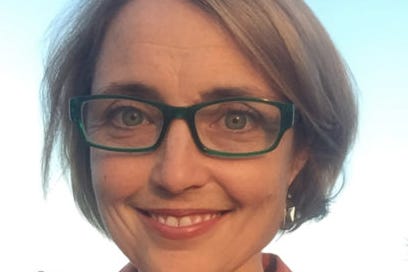A few thoughts about Courtney Everts Mykytyn
(Photo taken from this interview, which is worth reading.)
Courtney Everts Mykytyn died on Monday in Los Angeles. It was a sudden, tragic accident. She is survived by a husband and two kids and, surely, a beloved community of people who knew her personally. She is also survived by a sprawling virtual network of people, many of whom had never met her in person, but all of whom she influenced profoundly.
Everts Mykytyn was the founder of Integrated Schools. Over the past few years, she, more than anybody I’ve encountered, has been responsible for reimagining what practical anti-racist action for white people could look like.
She took an issue (white parents and the metric ton of problematic choices we make in choosing where our kids go to school) that too often has led only to navel gazing, and instead, just got to work. She understood that, left to our own devices, white parents typically funnel our kids to some carefully curated combination of suburban, private, magnet or thoroughly gentrified schools. More so, though, she understood (from first-hand experience) that even if white parents were to choose predominately Black and Brown neighborhood schools, we would then be susceptible to a whole cascade of other problematic moves (taking over PTAs, disproportionally influencing the administration to benefit our kids, referring to our new school as a “hidden gem” as if we were some sort of frontier colonialist, just generally being overbearing jerks).
Her dream, instead, was a nationwide network of parents who worked hard to be partners and not saviors. Her charge was for white parents to choose schools with predominately Black and Brown student bodies that weren’t offering the predictable menu of programs marketed to a paler demographic (Montessori, STEM, etc.). Her secondary charge was for those parents to be constantly vigilant as to our impulses to bend the school to our comfort rather than supporting the dreams of the school community as a whole. She believed in the possibility of a grassroots undoing of a pattern that we’ve always assumed to be intractable— school systems are cursed to exist at the mercy and whims of white families and white families alone. Those families, in turn will only act within a narrow, racially imprinted sense of self-interest.
This is all easier said than done, of course, which is what makes the how of Integrated Schools, and of Everts Mykytyn’s general ethos, so brilliant. She recognized that the choice that she was asking white parents to make was a lonely one— it isolated them from concerned relatives and play-group peers. She was simultaneously sympathetic to that loneliness while remaining vigilant about all of the ways that those nice white parents could and would still cause harm. Her solution was community building on a shoestring budget. She built a network of Facebook groups and podcasts and book clubs. She launched local affiliates across the country. She hopped on the phone with seemingly anybody who wanted her time. She connected people with each other. At every moment, she balanced empathy with honesty— she pushed as she supported.
In a few short years, there have already been hundreds of parents striving to live the vision that she laid out— to be good neighbors, to resist the ingrained urge to push our kids to the front of every single societal line.
I never met Courtney Everts Mykytyn and I don’t want to overstate my connection to either her or the network she built. We talked on the phone for a couple hours last summer, mine being one of many conversations with random strangers she’d have seemingly every week. She was direct and funny and self-deprecating and curious. She neither puffed herself nor her work up, which only made me want to get more actively involved. No matter what city I named, she had a list of people with whom she could connect me. She challenged me directly at multiple moments— every single prod was helpful. I told her that I had low expectations for the efficacy of Facebook groups; she laughed and said she totally agreed, but that I should check their’s out. She didn’t claim it was perfect, but assured me that if I spent some time there, I’d realize it was special— that it scratched a real itch for a lot of folks.
I logged on immediately after our call, spending an hour reading testimonials, requests for help and honest, non-performative discussion of sticky moral terrain. “Dammit,” I remember writing her afterwards, “you were right.”
By all accounts, Courtney Everts Mykytyn was just getting started. It’s one of the many reasons why news of her death hits even long-distance admirers like a ton of bricks. We are all so fortunate, however, for the roadmap that she left behind. If you haven’t listened to her podcast or spent time on the online community she built, please do so.
That’s only a piece of her roadmap, though. What’s brilliant about Integrated Schools isn’t just a well-produced podcast or a non-toxic Facebook group, but the recognition that there are thousands of white people out there who are seeking not just the opportunity to do better, but a community to do it with them. She saw our need for belonging. She knew that communities, even virtual ones, could offer not just comfort, but a chrysalis as well.
Today, I’m holding her family and those who knew her in the light. Tomorrow, I’ll do my best to walk the road that she mapped for us.




